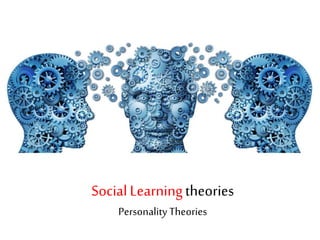
Social learning theories - Personalities theories
- 2. Prepared By Manu Melwin Joy Research Scholar School of Management Studies CUSAT, Kerala, India. Phone – 9744551114 Mail – manu_melwinjoy@yahoo.com Kindly restrict the use of slides for personal purpose. Please seek permission to reproduce the same in public forms and presentations.
- 5. Social Learning theory social learning theory was proposed by Neal E. Miller and John Dollard in 1941. The proposition of social learning was expanded upon and theorized by Canadian psychologist Albert Bandura from 1962 until the present. . Bandura provided his concept of self-efficacy in 1977, while he refuted the traditional learning theory for understanding learning.
- 6. 1. Social learning theory, used in psychology, education, and communication, posits that portions of an individual's knowledge acquisition can be directly related to observing others within the context of social interactions, experiences, and outside media influences. 2. In other words, people do not learn new behaviours solely by trying them and either succeeding or failing, but rather, the survival of humanity is dependent upon the replication of the actions of others. 3. People learn by observing others, with the environment, behavior, and cognition all as the chief factors in influencing development. These three factors are not static or independent elements; rather, they are all reciprocal Social Learning theory
- 7. The main tenets of Albert Bandura’s theory are that: • people learn by observing others • the same set of stimuli may provoke different responses from different people, or from the same people at different times • the world and a person’s behaviour are interlinked • Personality is an interaction between three factors: the environment, behaviour, and a person’s psychological processes. Concepts
- 8. Bandura proposed a four step conceptual scheme of the process involved in observational learning: • Step 1: This first step incorporates the attention processes that are involved including certain model characteristics which may increase the likelihood of the behaviour being attended to. • Step 2: The second step refers to retention processes including the observer's ability to encode, to remember and to make sense of what has been observed. • Step 3: The third step refers to motor reproduction processes including the capabilities that the observer has to perform the behaviours being observed. • Step 4: The final step refers to motivational processes including external reinforcement, vicarious reinforcement, and self-reinforcement. If a behaviour is to be imitated, an observer must be motivated to perform that behaviour. Observationallearning
- 9. • According to Bandura, behaviour is influenced by multiple determinants. • The concept of reciprocal determinism proposes that these factors have an interactive effect on each other and that they exist in the environment as well as within the individual in the form of affect, cognition, and constitutional disposition. • External rewards and punishments, internal beliefs and expectancies all form part of a complex system. • Consistent with the principles of systems, a change in one aspect requires a change in all others so that balance and equilibrium can once again be achieved. ReciprocalDeterminism
- 10. Bandura used the term self-efficacy to refer to a person's belief that he or she can successfully carry "courses of action required to deal with prospective situations containing many ambiguous, unpredictable, and often stressful elements“. Among the sources of self-efficacy are: • performance accomplishments: Past experiences of success and failure in attempts to accomplish goals are the most important regulators of self-efficacy; • vicarious experience: When individuals witness others' successes and failures, they are provided with information which they can use as a basis for comparison for their own personal competence in similar situations; • verbal persuasion: Being told by others that one can or cannot competently perform a particular behaviour can lead to increases or decreases in self-efficacy; • emotional arousal: Levels of self-efficacy are also proposed to be Influenced by the degree and quality of the emotional arousal an individual experiences when engaging in a particular behaviour in a specific situation. Self Efficacy
- 11. • Behaviour has been found to be more consistent than is argued by Bandura's theory which focuses a great deal on the situation. Some researchers have argued that the theory lacks attention to biological or hormonal processes. • Probably of most significance is the criticism that the theory is not unified. Concepts and processes such as observational learning and self-efficacy have been highly researched but there has been little explanation about the relationship among the concepts Criticisms
- 12. Thank You
- 13. Other TA topics available on slideshare 1. Strokes - http://www.slideshare.net/manumjoy/strokes-24081607. 2. Games People Play - http://www.slideshare.net/manumjoy/psychological- games-people-play. 3. Structural Analysis - http://www.slideshare.net/manumjoy/the-ego-state-model. 4. What is TA? - http://www.slideshare.net/manumjoy/what-ta-is 5. Cycles of Development - http://www.slideshare.net/manumjoy/cycles-of- developement-pamela-levin-transactional-analysis. 6. Stages of Cure - http://www.slideshare.net/manumjoy/stages-of-cure. 7. Transactions - http://www.slideshare.net/manumjoy/transactions-33677298. 8. Time Structuring - http://www.slideshare.net/manumjoy/time-structuring. 9. Life Position - http://www.slideshare.net/manumjoy/life-position. 10. Autonomy - http://www.slideshare.net/manumjoy/autonomy-33690557. 11. Structural Pathology - http://www.slideshare.net/manumjoy/structural-pathology. 12. Game Analysis - http://www.slideshare.net/manumjoy/game-analysis-33725636. 13. Integrated Adult - http://www.slideshare.net/manumjoy/integrated-adult. 14. Stroke Economy - http://www.slideshare.net/manumjoy/stroke-economy- 33826702.
